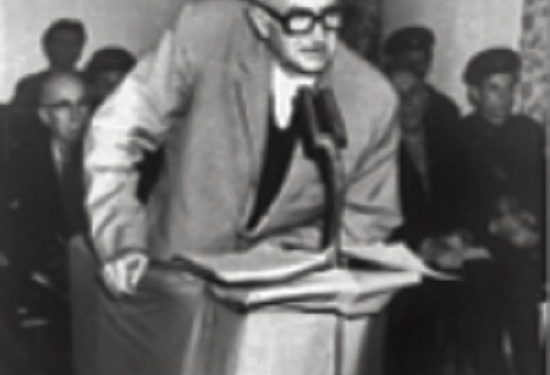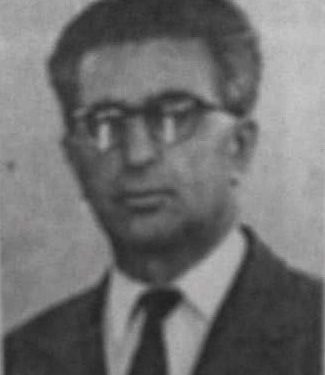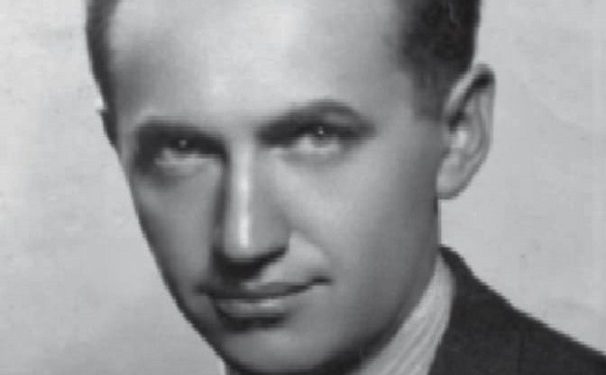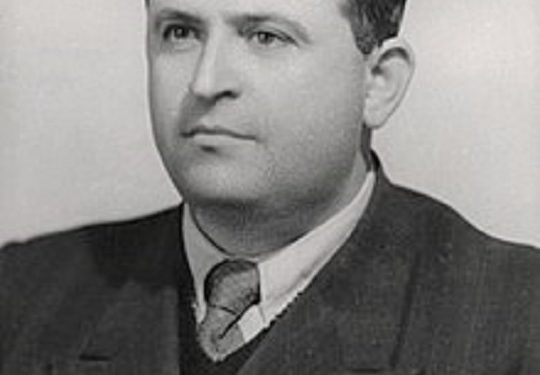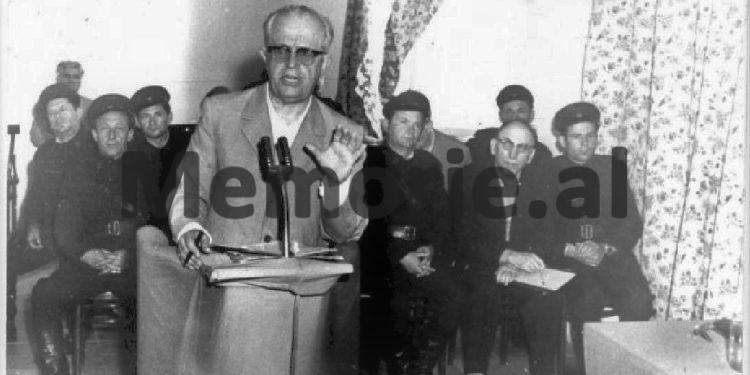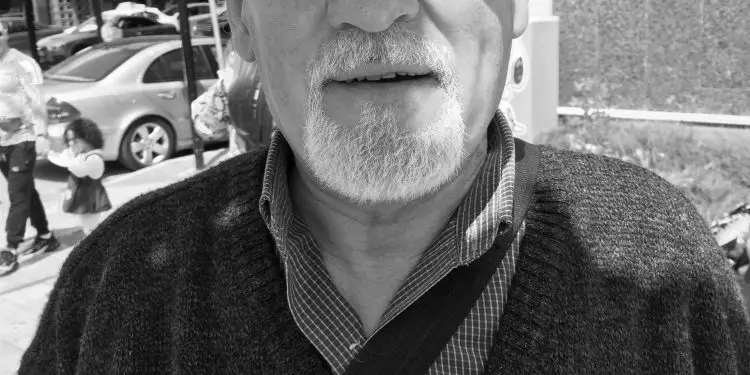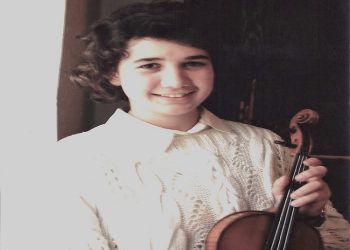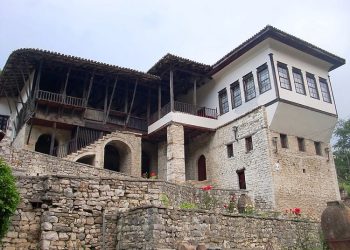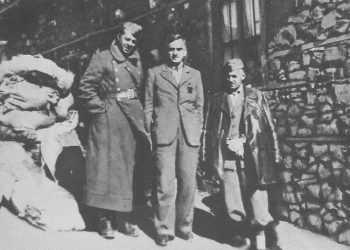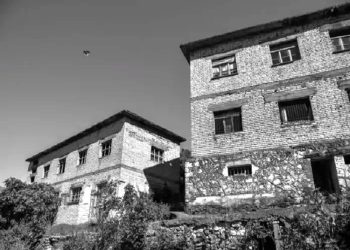By Astrit Jegeni
The third part
Memorie.al / Ahmet Jegeni, a senior official of the Enverist regime, held numerous party and power positions in that political system, among others he was the director of the port of Durrës for many years. Later, he started working at the Ministry of Foreign Trade and was appointed Secretary of the Party Organization of this Ministry, until he was arrested on the charge of “hostile activity” with the so-called Kiço Njjela’s group and friends, a charge he did not accept, for almost a year. The violence exercised in the communist investigation broke him and he writes this memoir, accepting the cooperation with the accusation, which at first he did not accept. In extreme personal physical and psychological conditions, he describes in writing himself, his colleagues, his family members according to the desire and the communist moral political mindset.
In my childhood memory, I have an image of a man of average height, slightly built, well-dressed in clothes bought outside Albania, dignified. On the street, and when he happened to meet my father, he greeted him with his head, but always with the appropriate distance and coldness, which stemmed from the fact that they belonged to two different political strata and opposite social positions. They were almost the same age, they were cousins, and they had been together in the partisan detachment of Dibra e Madhe, with Commander Haxhi Lleshin.
My father has shown me moments from the surrender of the Italian army after the capitulation of Italy, and it was Ahmeti, who got into a “Caro-armato”, a car reinforced with thick sheets, and went himself to the Italian barracks of Dibra e Madhe, to negotiate with the Italian command there. My father begged and asked him not to go, because the Italians would kill him, but he was not afraid. After a few hours, the Italians accepted the agreement with Ahmet, they with their personal weapons and daily food, released their barracks to the partisans and headed towards Peshkopia.
In the endless conversations of my tribe, Ahmeti was treated with care, thanks to the fact that he was a high-ranking communist functionary, I believe it was Jegeni, who had the highest post in the communist regime, the absolute majority of Jegeni, were anti-communists. Another Jegeni with communist beliefs and who had high party and state functions was the son of my uncle, Eqerem Begut, Besnik Jegeni, but he had functions in Macedonia and we actually knew little, or nothing, about his real social weight.
However, Ahmeti was seen with sympathy, as a man who knew how to maintain a reasonable attitude of respect towards his tribe, who were generally labeled “reactionaries” by communist propaganda and mentality. Only in cases of death, Ahmeti appeared for the occasional visit, and these were very rare. We were in political exile, when we got the news that Ahmet was arrested, my father expressed regret, but that was all. He didn’t take it in his mouth, neither for better nor for worse.
Later, when we returned from exile, with Pranvera, Ahmet’s sister, who was in Tirana, we had endless and long conversations about Ahmet and his relationships with his family, about his mother who lived with Pranvera, and not with his son, his wife from the Strazimir tribe, Dhurata, sister, brother, who lived outside Albania, the nearby tribe, and my perspective on Ahmet changed.
I remember Mitrushi, his brother-in-law, “Hundelesh”, that’s what I called him because he had fur on his nose, a charming, cultured man, quite entertaining and very modern for the time, when he came to our house, he created a pleasant atmosphere. It was a pleasure to listen to that man. Unfortunately, Ahmet’s relations with his wife, mother and sister were, according to Pranvera, unpleasant and problematic. However, various acquaintances and strangers I met, when they asked me about my last name, the first subsequent question was; what is your relationship with Ahmet?
They all spoke well of him. When I got hold of this memo and read it, I was stunned, I didn’t like it and I was disappointed by Ahmet’s personality, I was surprised. Ylli Selenica, a good friend of mine, who was a political prisoner, told me, when he was alive, not to judge people from the data of the communist investigation, because it was a very violent body of justice and few people could to bear it, they were forced to accept whatever was imposed on you, it is enough for the torture to stop. However, I was very hesitant to make the memorandum public.
Morally, I did not like the figure of Ahmet. Sebep became a person who knew Ahmet to change his mind. In a debate with me, he spoke with superlatives about the figure of Ahmet Jegen, taking him to the limits of singing hymns. Annoyed and tired of the lack of a sense of reality for the human figures that people have in their subconscious, I decided to publish this memoir. What I am publishing is a small part of this memorandum and, perhaps, the most “famous” of the entire memorandum, which for me is extremely inappropriate, almost on the verge of shame.
The memorandum of Ahmet Jegen, made in the Enverist investigation, in the form of a manuscript, consists of 184 pages, it was written under conditions of violent physical and psychological dictation to the investigator. It is written on A-4 paper, of poor quality, locally produced, written in black pencil, on both sides of the paper, most of the handwriting is in pencil about 80%, the rest in blue and red pen, a relatively fine handwriting, but clearly legible and free of spelling errors.
During the investigation, a part of this material, about 10-15%, was typed by the employees of the Investigation and given to read by Ahmet Jegeni, who in some places interfered with his writing, to clarify the sentence and to too self-willed, to burden himself more before the law Indicator of psychological and physical submission to the violence that was done to him during the investigation. During his typing, some words were adapted from the dialect of Dibra e Madhe. in literary language, but without changing the meaning of the sentence. Some expressions and words are not correctly transcribed, but they have not deformed the logic of the sentence. It should be noted that for a long time, about a year, Ahmet Jegeni did not accept any of the accusations of the investigators, but after many months of physical and psychological violence, Ahmeti surrenders and accepts the accusation.
“For hostile activity” and begins to write his self-denouncing memoirs, which I believe were written not because he felt remorse for his political and state activity, but because he was totally surrendered by the great physical and psychological pressure, he hoped that he will come out alive from the hell of the communist investigation. He could have acted differently, but he didn’t. In reality, most of the political prisoners from the communist regime did not withstand the physical and psychological violence and surrendered and signed what the communist investigator wanted.
The handwritten manuscript bears the date 4.10.1976 and is signed by him, while the typewritten material has the same date, but is not signed. It should be noted that there is a discrepancy in time between the date of his arrest and the date when Ahmeti started writing these manuscripts. Ahmet Jegeni died in the investigator. According to medical records, death was caused by a heart attack. I am inclined to believe that his death came from the unbearable living conditions of the investigation and physical and psychological violence. His case did not go to trial. Legally, Ahmet Jegeni is considered innocent.
We are giving them to be read as they are written in the typewritten original, contrasting each line or proper name with the handwritten original. The memo for me is interesting, that apart from the general historical character that we are informed about, in this interesting memo, is the information we get from the very good trade relations between Albania and Yugoslavia. At this time, Yugoslavia was the second partner after China, in Albania’s trade volume, it should be noted that the Albanian-Chinese political and economic crisis had begun to have its effects on the country’s economy; the ironic fact is that we have a report of obliquely with Enverist hostile propaganda for Titism and very good trade relations with Yugoslavia.
Continues from last issue
The handwriting of the defendant Ahmet Jegeni
It seems that Kiço Ngjela knew about his brother’s case, that’s why he made that provocation, maybe if the conversation had been longer, he would have found out what he wanted to say and where he wanted to reach, it would have been good if the conversation had been longer. Likewise, Kiço Ngjela’s talks with the Yugoslav delegation and his expressions about increasing trade, about raising the rank of the delegation, also encouraged me to increase trade with Yugoslavia.
In the same way, the directors of the Foreign Trade Enterprise, starting from the end of 1972, have been more predisposed to trade with Yugoslavia, the arrivals of Yugoslav specialists here and the departures of ours there, the lunches and dinners that were served brought them quite close, with we remember the occasion of the lunch with the Yugoslav specialists, given by the Foreign Trade company, according to Vasil Kati’s wish, in 1974, where Andrea Manço was sitting near Sokol Niman, while Sami Muhameti, facing the latter, and they toasted each other, encouraging others as well, as if it were a family celebration and not an official lunch with strangers.
Reshat Sinemati managed to go to lunch and dinner, even with the Yugoslav drivers, so friendly was he with the Yugoslavs. Then this atmosphere influenced me to increase trade with Yugoslavia.
In 1973, especially 1974, the comings and goings of Kosovars, Dibrans, artistic teams and groups, other university delegations, also influenced me to be willing to accept Yugoslav specialists. I have remembered that in this period, as if there was a softening of state relations, certainly conjunctural, therefore I did not hesitate to increase commercial relations.
Another important influencing factor for my liberal attitude towards trade relations with Yugoslavia was the attitude of the staff of the Yugoslav embassy towards me. Ay has been respectful, warm. So the ambassador, whom I have met at several receptions, both at his place and at others, has always come and greeted me, he has been interested in how things are going, what obstacles Yugoslav companies face, because he has orders directly from the Ministry of Foreign Affairs and that of Yugoslav Foreign Trade (even these with higher orders), to inform Belgrade about even the smallest obstacles that could hinder the development of trade between the two countries.
The same position has been taken by the Counselor of the embassy, Koncatina, as well as the economic advisor, Teafil Radoeshki. The latter, when we met for the first time in 1974, told me that he had seen me at several foreign receptions and that I looked like a familiar face to him, he was interested and had been told that I was from Dibra.
Another time he told me; I am also from Dibra, he told me, he was telling me how his father had been a shajak worker in Dibra and Maqellare, he himself had done well and had company with the Dibra people (Albanians) and he mentioned to me the names of Xhafr Kodra, Azmi Muca , Jashar Hamës, Lutfi Rusit, Met Kërliut, all these people known to me and about whom I spoke at the beginning, that I worked with them in 1941 in Dibër, I met them in September 1943, in Dibër (when it was liberated ) as well as in 1945, also in Dibër.
Of course, by mentioning these names, he wanted to show me that we both need to talk and solve the problems, maybe he had some purpose, mentioning them, probably the vast majority of them were with Tito, but never did he not do this, but of course he did it anyway for “moral pressure on me”. In fact, I have solved the commercial problems that he has raised with me, and he has also tried to solve them.
He told me that the Yugoslav leadership itself is interested in trade problems with Albania, and he mentioned to me the fact that Yugoslav companies have suffered from financial means and were unable to liquidate their obligations to Albania (or open loans), they were given a strict order for this situation to be resolved and in fact, they were resolved in general terms.
When a driver from Dibran was arrested in our country, for smuggling, he asked me to intervene in the Foreign Trade and to be released (he told me that he is also from Dibran), I told him that every country must be respected and we cannot we do something I have agreed with those from the embassy that when they have problems, they should contact us and we will solve them.
Likewise, I fell under the influence of the Yugoslav delegation, when in 1974, we closed the protocol of 1975. I accepted their requests for chrome and other items, as well as the increase of the operating bank credit limit within the year, from 800 thousand, in 2 million dollars, is their influence. My attitude towards Yugoslavia was also influenced by my visit there. I was several times in 1947, June 1948, in September 1949, April 1950, as well as in May 1973, and I also stayed one night in transit to Tirana, 3 times.
I was impressed by the big difference from 1950, marked movement of people and cars, the market was full, but the prices were increasing from time to time, the worldly life was not so different from that of the West, I had heard from visitors who came to Albania, that they talked about people I knew in Dibër, who had cars and went on vacation to foreign countries.
When these visitors came, there was plenty of loot for their relatives. All these have also impressed me and influenced my opinion, that we can find enough goods in Yugoslavia, because it is developed (I was clear that this was done as a result of the policy that was followed, extending a hand to anyone) but the psychological effect is created in such a way that it affects and acts, so this also influenced me.
All this has made the issue of trade with Yugoslavia, I see it not as the Party orders, i.e., to be seen primarily politically, I have seen it only from the economic side, of course goods, and in this way I have damaged the politics of the Party and therefore, indirectly I helped to achieve the Yugoslav goal.
That is, for Yugoslavia to slowly take the second place in trade with Albania (after China), to give Titist propaganda a chance, both for internal effects (especially for Albanians): and international, that Albania is it needs Yugoslavia, it even gives temporary loans, because as you know, the bank balances at the end of each year have been passive for us and active for Yugoslavia.
This is a harmful attitude, maybe the final Titist goal is the subjugation of our country, it was also in 1948. Therefore, this attitude of subjugation to the Yugoslavs is a very serious fault, and I now understand how much harm I have brought to the Party and the state, I deeply regret it and any punishment that will be meted out to me is completely justifiable.
Well done the Party that discovered this activity, if it was left like this, what would be achieved: Of course, the new 5-year agreement, would further promote the growth of trade and therefore our economy, would depend on a good part from titism, with all the consequences for this, that of course it is clear that in addition to me, Kiço Ngjela, Vasil Kati, Janko Nishku, the directors of Foreign Trade Enterprises, are also responsible for this our embassy in Belgrade.
Kiço Ngjela told the investigator that for the increase of trade with Yugoslavia, he was subjected to the pressure of the apparatus, headed by Ahmet Jegen. This is a deposition that is both false and tendentious, in order to reduce his responsibility. Kiço Njela has never commented on the lists with Yugoslavia (I am speaking during the time when I was in charge of Yugoslavia), even he added goods with his own hand, such as; sugar, oil, for which the government had allocated free currency), trucks, spare parts, etc.
Not to mention here the occasional cases, that for urgent goods, he himself ordered the directors of the enterprises (that this was his work practice, displacing the Ministry’s apparatus), to buy them in
Yugoslavia, even Vasil Kati ordered, to the car also started to pick them up. Kiço Njela spoke to the Yugoslavs about increasing trade and raising the level of the agreement.
In the Ministry, Vasil Kati told the Yugoslav Deputy Minister of Foreign Trade, Glishic, in 1974, how the production of corn in Yugoslavia is presented. Ay answered; this year is good, but we still don’t have anything for export.
Later, I learned that Kiço Ngjela and Vasili had discussed that China does not give us the full amount of bereket requested, to ask the Yugoslavs, so this was a preparation. Of course, this is not up to me to draw the conclusions of this matter, but I thought that the “head” in the Ministry (Kiço Ngjela) was in order, even if there had been attempts or hostile actions by others, this one with the Party line, would have shown the place to each one.
In the investigation, I learned that now, the balance with Yugoslavia is active for us, I am happy about this, because the Titists’ noses are broken, this also shows that when the Party’s line is implemented, there is nothing that cannot be done and our economy is getting stronger day by day day, and not as it was said before, that if imports are reduced for the balance, i.e. also from Yugoslavia (to reduce the balance), production will suffer, etc.
Therefore, we must honestly admit that in this regard, we consciously sabotaged the Party’s line, damaged the country and must be held accountable. As I said before, I have a brother in Yugoslavia, (Petrit Jegeni), who is about 9-10 years younger than me.
During the National Liberation Movement in Dibra, he was organized as a pioneer and during the war in the city of Dibra (end of October – November 17, 1943), the pioneer organization made a valuable contribution to the partisans. After the Germans entered Dibër (November 17, 1943), until its liberation (September 1, 1944), my family lived in a village (Dabasisht), because it was afraid of German reprisals, with which my sister and I were in the partisan ranks…! Memorie.al




